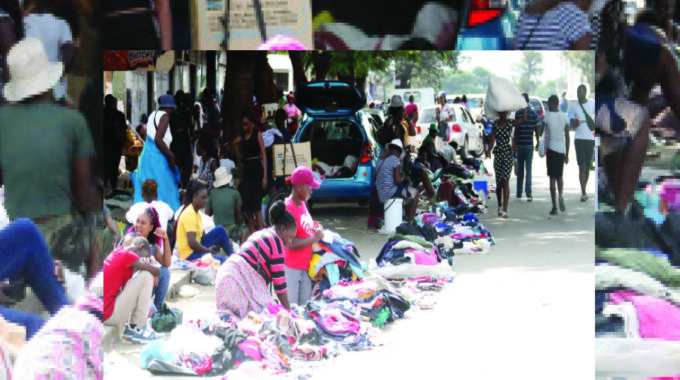Hurdles faced by informal traders in quest for better fortunes

Nqobile Bhebhe, [email protected]
IN many African cities, the informal sector is one of the most lucrative and Bulawayo is no exception.
The fast-expanding sector provides work and livelihoods for many households.
According to the IH Securities 2024 equity strategy report, the 2022 FinScope micro, small and medium enterprises (MSME) survey report estimates that the country’s informal sector has an annual revenue of US$14,2 billion, with about US$2 billion in cash circulating at any given time.
With such amounts, IH Securities noted that corporates will continue to pursue strategies to target the informal sector to ensure sustained access to US$ cash.
“According to the RBZ MSME survey, only 14 percent of MSME’s are formally registered or have a trading licence. In our view, the country’s consumer economy is now clearly premised in USD cash — we believe it is unlikely that this trend reverses in the short to medium term.
“Corporates will continue to pursue strategies to target the informal sector to ensure sustained access to USD cash and subsequent USD earnings in some form or the other. We lean towards businesses with strong penetration strategies into this market.”
The IH Securities 2024 equity strategy report adds that the “informal sector acts as a ‘hidden’ buffer for shocks in the formal sector such as inflation, currency collapses, company closures, and rapid policy changes by accommodating the labour force which cannot be formally absorbed.”
It is estimated that about 80 percent of the country’s economy is now in the informal sector hence the calls for harnessing the informal economic activity into the mainstream economy.
Bulawayo is battling with an ever-increasing number of vendors trading at undesignated places with a vast majority setting up makeshift stalls on pavements in the city centre.
Numerous raids by municipal police and the Zimbabwe Republic Police seem to be failing to curb the rise in unregulated vendors. However, despite many operating illegally and not paying taxes, some operate in regulated spaces falling under an association.
Traders operating at Entumbane, Nkulumane Complex ranks and Nkulumane Sekusile Centre fall under Bulawayo Vendors and Traders Association (BVTA).
BVTA executive director Mr Michael Ndiweni told Chronicle that although traders make “decent” daily takings from various sales, they could do better by improving marketing strategies, strengthening synergies across the value chain and embracing technology.

BVTA executive director Mr Michael Ndiweni
He noted that at Entumbane Complex, there are 75 vendors of which 45 deal in fruits and vegetables and 29 in dried foods, with an average trader making at least US$60 daily.
This means that in a good week, one pockets about US$430.
Average daily takings at Nkulumane Sekusile range between US$15 to US$30 while at Nkulumane Complex rank stalls — 11 fruit and vegetable stalls are averaging between US$20 to US$23 daily.
With such economic value, Mr Ndiweni said the trading environment calls for improvement.
“It is almost suitable although the scale is not balancing and depends on the quality and types of products one is selling, more so marketing strategy or linkages, though implementing new technologies and modernising the infrastructure can greatly improve the balance of the scale,” he said.
Mr Ndiweni is of the view that by investing in advanced equipment and systems, businesses can increase their efficiency and reduce costs, ultimately leading to greater profitability.
“Additionally, developing strong marketing strategies and establishing linkages with other companies can help expand the reach of products and services.
“It’s important for businesses to stay up-to-date with market trends and consumer demands to remain competitive. Continual innovation is key to success in today’s rapidly changing market landscape.”
Mr Ndiweni said for the sector to thrive, members should embrace swipe payments. There is a need to collaborate with stakeholders across different sectors and come up with innovative solutions that can help improve access to digital payment systems and other modern technologies.
“In as much as it is good for a country to adopt modern technologies, which as an organisation we encourage and advocate for, there are limitations.
“Using plastic money is not feasible for informal traders due to the prevalence of hard currency usage in their business transactions. As such, we need to find alternative solutions that can help them embrace digital payments.”
Mr Ndiweni said transaction costs associated with using digital payment systems are high, and this makes it difficult for small businesses to adopt these technologies.
As such, he said: “We need to work towards reducing these costs so that more informal traders can benefit from the convenience of cashless transactions.”
Another challenge facing the adoption of modern technologies is the lack of access to reliable internet connectivity and high costs, he adds.
“This limits the reach of digital platforms and makes it difficult for businesses operating in remote areas to take advantage of these tools. To address these challenges, we need to collaborate with stakeholders across different sectors and come up with innovative solutions that can help improve access to digital payment systems and other modern technologies,” explained Mr Ndiweni.
The cost of opening bank accounts in financial institutions is also another factor prohibiting traders from using plastic money, he noted.
Ultimately, he said the goal should be to create an environment where everyone has equal access to technology and can use it to improve their lives and businesses.
“By working together towards this common goal, we can build a more inclusive and prosperous society for all.”
Addressing delegates at the inaugural Annual Financial Inclusion conference in Victoria Falls last year, Finance, Economic Development and Investment Promotion Minister, Professor Mthuli Ncube said Zimbabwe is one of the global leaders in facilitating mobile banking, a development that was driven by mobile telecommunication service providers and has helped to entrench financial inclusion in the country,
Prof Ncube applauded mobile telecommunication firms for spearheading the drive.
“We move faster when the telecom companies or mobile network operators (MNOs) take the lead but they must be properly regulated. The provision of mobile banking is a critical step in the financial inclusion drive,” he told delegates.
Financial inclusion is defined as the availability and equality of opportunities to access financial services. It refers to a process by which individuals and businesses can access appropriate, affordable, and timely financial products and services.
National financial inclusion increased to 88 percent in 2022 from 77 percent in 2014, meaning about 6, 2 million adults out of a total of 7 million adults in Zimbabwe are now financially included.
A trader at Entumbane Complex rank, Mr Nhlanhla Moyo said while he would gladly accept mobile money payments, the key challenge is on their suppliers who prefer cash payments.
He added that the costs of maintaining bank accounts were too high for vendors.
“I have attended several entrepreneurial skills training workshops and the dominant topic is on plastic money payments. I have no problems accepting such payment. Carrying a lot of cash attracts thieves.
“However, our suppliers prefer cash. This then forces us to also sell our goods in cash only. Also, I don’t think I can manage maintaining bank accounts, costs are too high,” said Mr Moyo.
To further boost the sector and create a win-win situation, Mr Ndiweni noted the following:
There is a need to develop strategies to increase access to financial services for informal sector workers.
Need to de-congest the city and create new business hubs in suburban areas, make products easily accessible to the markets and this improves the management of informality and enhances the transition from being informal to formal.
Continue establishing community public-private partnerships with local organisations to provide tailor-made programs for the sector.
Implement programs to support the growth and development of small businesses in the informal sector.
Conduct regular market research to better understand the needs and challenges of informal sector workers.
Create platforms for networking and collaboration among the informal sector and stakeholders (market fairs). —@nqobilebhebhe












Comments